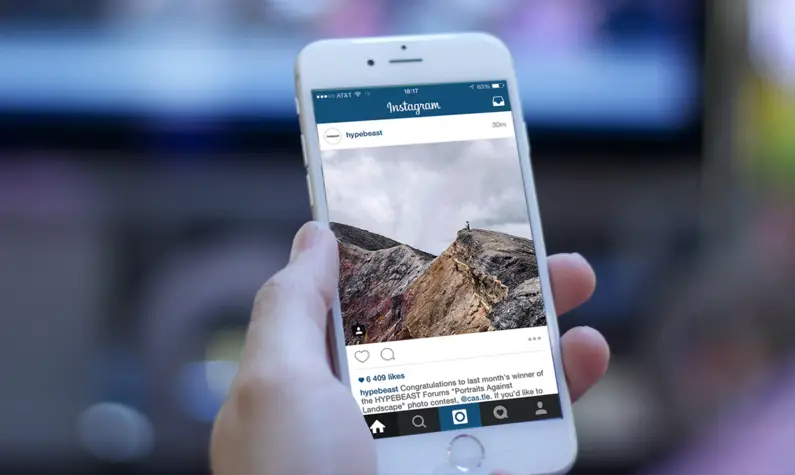Ah, Instagram. Most don’t go a day without opening up the iconic app. If anything, it is the first thing people check after opening their eyes in the morning. Whether you’re checking how many likes you got on your selfie or stalking your ex, you can’t help but tap on that mesmerizing pink-purple icon that leads to the gates of social media heaven.
Instagram can satisfy a wide array of needs. Want to see what your friends are up to? Check their Instagram story. Want to find out when your favorite artist goes on tour? Check their bio.
Maybe you need some motivation to start working out? Look up #gymmotivation to get hit in the face with motivational quotes and clips of buff dudes and big booty girls working out. You can find pretty much anything you’re looking for on Instagram from dessert recipes to cat videos.
Instagram’s slogan is “Capture and Share the World’s Moments,” which anticipates sunset photos paired with captions of cliché quotes, but the worldwide platform has grown into something much more than that.
Although Instagram’s founders, Kevin Systrom and Mike Krieger, are rolling in the dough, not everything here is s—s and giggles. There are actually quite a few negative side effects from regularly using Instagram.
You Become a Stalker
Don’t front like you haven’t gone on your ex’s Instagram page with the intention of just checking to see if they have posted anything recently, and before you know it, you end up on their mom’s friend’s second cousin’s page.
You continue scrolling through their mom’s friend’s second cousin’s feed and accidentally double tap a picture from last year. You done f—ed up now.
Suspect your man of cheating? You can probably find the truth on Instagram if you lurk hard enough. Although the app is great for connecting with friends and family, the definition of “connect” has gone a bit too far.
Modern technology has successfully trained people to feel obligated to know what everyone is doing at all times. With the assistance of geotags, time and date stamps and user tagging, Instagram users have become part-time detectives.
The only difference is that real detectives are supposed to investigate; you’re not. Stop lurking for your own good.
Procrastination at its Finest

More times than not, when I grab my phone it’s out of habit, not necessity. I’m sure you do the same. It has become second nature to grab your phone and go straight to Instagram, even though you refreshed your feed literally five minutes ago.
Your fingers are so accustomed to the motion that you could do it in your sleep — and you probably do. Add a research paper to write on top of that addiction, and you got yourself a sticky situation.
You’re sitting there, swearing that you have no idea what to write for your paper, and then you remember you also have a calculus assignment due at midnight. Out of stress and bad habit, you grab your phone and lie to yourself, “I’m just gonna take a quick break.” Your hungry fingers feel relieved, happily scrolling and double tapping away.
*Spongebob voice* “Two hours later.” Whoops.
What have you done? You swore it was just going to be a quick break and then back to work, but no. Instagram has lured you into its procrastination trap.
Flexing for the Gram
According to the good ole’ trustworthy Urban Dictionary, “Flexing for the Gram” is defined as “When you are constantly taking selfies or pics of expensive merchandise to put on Instagram to show off.”
When I did have an Instagram, I always felt the need to show off a cute outfit I wore or a beautiful location I visited. Honestly, it took away so much from the present moment.
If I was admiring a view, I suddenly had to pull out my phone to capture it in its most appealing angle to show my followers rather than just indulging in what was in front of me.
If I thought I looked cute on a particular day, I had to take a selfie — excuse me, I meant 35 selfies — until I took a good one. What a waste of time and energy, and for what? Obviously for the likes and shallow comments of heart eye emojis.
Ask yourself if you would buy a certain item or go to a certain place if it weren’t for the Instagram flex.
Mental Health

According to a recent survey of 1,500 teens and young adults, Instagram was associated with high levels of anxiety, depression, bullying and FOMO (fear of missing out). The survey respondents have supported the idea of Instagram and other social media companies to establish a “heavy usage” warning within their apps.
Living in a modern world that is run by social media, it is the norm to take part in Instagram. Although it may come off as innocent at first, constantly consuming images on top of images of other’s lives can be damaging to your self-esteem and your mind.
The high consumption rate causes Instagram users to be in a vulnerable state of self-deprecation, which stems from comparison.
It becomes easy to see a photo and automatically criticize yourself for not looking the same or as “effortlessly” beautiful. In reality, “candid” photos are actually highly produced, which is not a bad thing, but people who consume these images need to realize that a lot of work went into making a photo look as good as it does.
In 2015, 18-year-old Australian model Essena O’Neill quit Instagram and publicly spoke about her experience. O’Neill had over 600,000 followers, regularly worked with brands and definitely posted envious Instagram photos.
After deleting her Instagram account, O’Neill posted a YouTube video discussing her reasons why. She explained how the app consumed her, and she felt she was living in a false state of reality.
While talking about one of her posts, O’Neill says, “I remember I obsessively checked the like count for a full week since uploading it. It got five likes. This was when I was so hungry for social media validation … Now marks the day I quit all social media and focus on real-life projects.”
O’Neill’s courageous act proves that not everything on Instagram is as it seems. Anyone can be dealing with anxiety, depression or a low quality of life that stems from the heavy use of social media.
This is not to blame Instagram in its entirety, but it is a PSA to social media users to watch their consumption closely. Even if it is not initially apparent, Instagram may be negatively affecting your well-being.

















